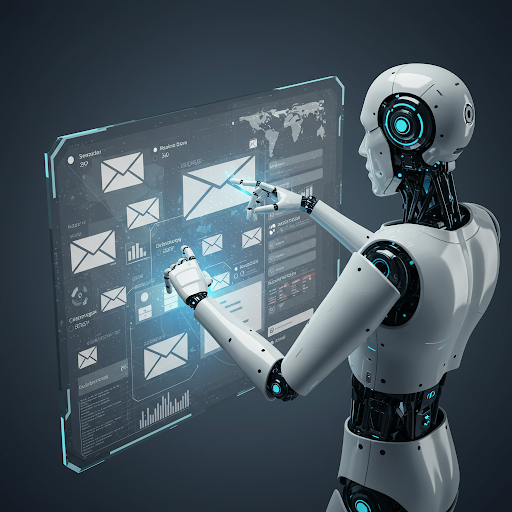Email AI Agent

Problem
- Overwhelmed Inboxes: Employees spend significant time managing, sorting, and responding to a high volume of emails, leading to decreased productivity and potential for missed important messages.
- Slow Response Times: Manual email processing can lead to delays in responding to customer inquiries, support requests, and sales leads, negatively impacting customer satisfaction and business opportunities.
- Repetitive Tasks: Answering frequently asked questions, scheduling meetings, and performing basic email triage are time-consuming and can be automated.
- Inconsistent Communication: Maintaining a consistent brand voice and providing accurate information in all email communications can be challenging for human agents, especially with varying workloads.
- Difficulty Prioritizing: Identifying and responding to the most critical emails quickly can be difficult amidst a large influx of messages.
Solutions
An Email AI Agent is a software solution powered by Artificial Intelligence (specifically Natural Language Processing and Machine Learning) designed to automate various email-related tasks. It analyzes email content, understands intent, and can autonomously or semi-autonomously categorize, prioritize, respond to, and manage emails, freeing up human agents for more complex and strategic work.
Key Features and Functionalities
- Intelligent Email Categorization and Prioritization: Automatically sorts and labels emails based on content, sender, and urgency. Flags important messages for immediate attention.
- Smart Reply Suggestions: Provides contextually relevant, one-click reply options for common inquiries.
- Automated Email Drafting: Generates complete email drafts based on prompts, context, or predefined templates.
- Personalized Responses: Tailors email content based on recipient history and email content.
- Automated Support Ticket Creation: Converts support-related emails into tickets in CRM/helpdesk systems with relevant information.
- Information Retrieval and Provision: Automatically provides answers to frequently asked questions or links to relevant resources within email responses.
- Meeting Scheduling Automation: Integrates with calendars to offer available meeting slots and schedule appointments directly via email.
- Sentiment Analysis: Detects the emotional tone of emails to guide more appropriate responses.
- Spam and Phishing Detection: Advanced AI-powered filtering to identify and isolate malicious emails.
- Email Summarization: Condenses long email threads into concise summaries.
- Integration with Business Tools: Connects with CRM, helpdesk, calendar, and other relevant business applications.
- Customizable Rules and Workflows: Allows businesses to define specific automation rules and workflows based on their needs.
- Reporting and Analytics: Provides insights into email volume, response times, and AI agent performance.
Benefits
- Increased Productivity: Employees spend less time on routine email tasks, allowing them to focus on higher-value activities.
- Faster Response Times: Automated responses and efficient triage lead to quicker replies to important inquiries.
- Improved Customer Satisfaction: Timely and accurate responses enhance the customer experience.
- Reduced Operational Costs: Automation can decrease the need for extensive manual email processing and support staff.
- Enhanced Consistency: Ensures consistent brand messaging and accurate information in all email communications.
- Better Lead Management: Automated follow-ups and engagement can improve lead conversion rates.
- 24/7 Availability: AI agents can handle basic inquiries and tasks outside of business hours.
- Scalability: The system can handle increasing email volumes without requiring additional human resources.
- Data-Driven Insights: Analytics provide valuable information about email trends and customer needs.
- Reduced Human Error: Automation minimizes the risk of mistakes in email processing and responses.
Tech Stack
- Automation Platform (n8n.io)
- LLM (OpenAI)
- Database (Supabase)
- Email Client (GMail)
Use Cases
- Customer Support: Automatically answering FAQs, providing troubleshooting steps, and creating support tickets.
- Sales: Automating initial responses to leads, scheduling demos, and sending follow-up emails.
- Marketing: Automating personalized email campaigns, segmenting audiences, and responding to inquiries about promotions.
- HR: Automating responses to common employee inquiries about benefits, policies, and procedures.
- Operations: Automating the routing of internal requests and providing updates on common operational processes.
- Executive Assistants: Assisting with calendar management, email filtering, and drafting routine communications.
- E-commerce: Automating order confirmations, shipping updates, and responses to basic customer service inquiries.
- Real Estate: Automating responses to property inquiries, scheduling viewings, and providing information packages.